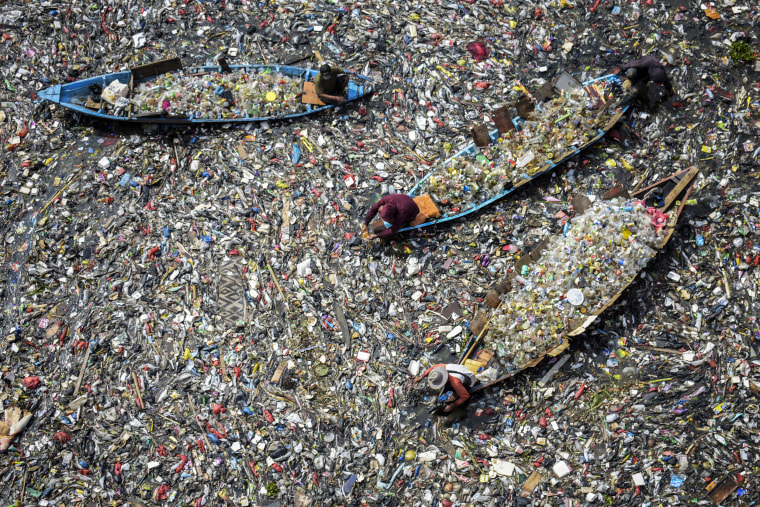Plastics 'crisis' is costing $1.5 trillion in global deaths and injuries, report says
Plastic production is set to triple by 2060, fueled by petrochemical-producing countries' pivoting away from declining fossil fuel use — and toward plastic.
A global “plastics crisis” is costing governments and taxpayers $1.5 trillion annually as they try to cope with escalating injuries, disability and deaths as the substance pollutes our land, seas and bodies, according to a new report by a leading medical journal.
Plastic production is on course to triple by 2060, less than 10% of it is recycled, and around 8,000 megatons now pollute the planet, according to a review of recent studies published Sunday by The Lancet.
That causes harm at every stage of its lifecycle: from the extraction of fossil fuels and production to its use by humans and eventual disposal into the environment, the British publication said.
“Plastics are a grave, growing, and under-recognised danger to human and planetary health,” it said. “Plastics cause disease and death from infancy to old age” and are “contributing to climate change, pollution, and biodiversity loss.”
The harms “fall disproportionately upon low-income and at-risk populations,” it added.

It is the latest dire warning by experts about the ubiquity of and threat posed by plastic, which the journal called “the defining material of our age.” After decades of scientists’ warning about plastic being found in the oceans and rivers, microplastics are now being discovered inside humans — including in breast milk and brain tissue.
Sunday’s release marked the start of a new monitoring system called “The Lancet Countdown on health and plastics,” which it says will track political attempts to combat the problem.
It was launched to coincide with the latest and final round of talks in Geneva, where 175 countries are trying to forge the world’s first Global Plastics Treaty.
Campaigners hope the talks, running Tuesday through Aug. 14, will result in mandatory targets to reduce plastic production. A group of countries, including China, Russia, Iran and Saudi Arabia, have opposed the measures, instead lobbying for increased plastic recycling.
According to The Lancet, such petrochemical giants are a “key driver” of spiraling plastic production as they pivot their businesses toward plastic in response to the global decline in demand for fossil energy.
Different plastics are made from up to 16,000 chemicals, which “enter the human body via ingestion, inhalation, and dermal absorption,” often from food and drink containers and packaging, the study said.
Unborn babies, infants and young children are “especially at risk,” with harms including miscarriage, physical malformations, reduced cognitive function and diabetes, it said. For adults, the risks include cardiovascular disease, stroke and cancer.
“Given the considerable gaps in knowledge of plastic chemicals, it is reasonable to conclude that the full extent of these chemicals’ harms to health is underestimated and that the burden of disease currently attributed to them is undercounted,” it said.
The Lancet quoted one study estimating the global costs of those diseases as $1.5 trillion.
“It is now clear that the world cannot recycle its way out of the plastic pollution crisis,” The Lancet said. “Control of the plastics crisis will require continuing research coupled with the science-driven interventions — laws, policies, monitoring, enforcement, incentives, and innovations.”

